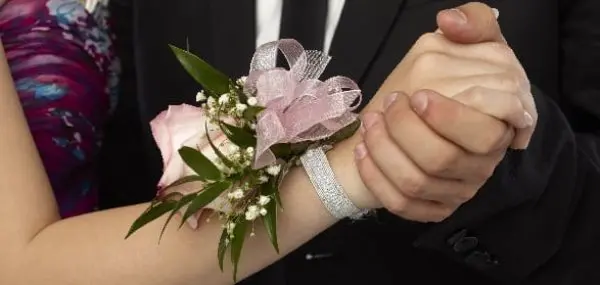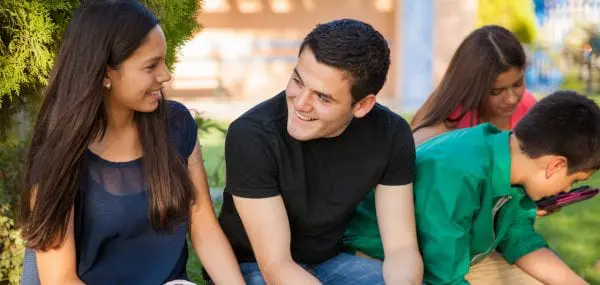Once upon a time, one of our kids went out on a date with a guy we didn’t know. One minute she was in our living room; then he texted that he was there, and she left. And my husband and I thought, “Wait, what just happened—should we have met him? Were we supposed to say something?” Suddenly we were in uncharted waters without a compass. This is something I’ve heard from other parents, too—that dating and relationships are something we don’t really talk about a lot with our teens. So, we decided to get an expert on board to help us navigate these situations.
Tori Cordiano is a licensed clinical psychologist and the director of research for Laurel School’s Center on Research for Girls. She graciously answered the most burning questions we’ve gathered over the years as parents and at Your Teen Media.
Teenage Relationship Advice for Parents
Q: What does it even mean today for kids to be “dating”? It seems like a new world out there.
Cordiano: Yes, it can mean so many different things. It could really just mean talking. Or “I’m kind of interested in her and we’re not even really talking yet,” especially for younger kids. I think maybe 15 years ago people would talk about “hooking up” and that was a term that could mean anything from holding hands to having sex, and anything in between. With the teenagers I work with who talk about dating, and they mean one person in particular, they will say “my boyfriend,” or “my girlfriend,” but it can also be more of a hanging out in a group experience.
As long as both people in that relationship are on the same page in terms of the relationship, and there’s an honesty and a clarity there, that’s the main thing.
Q: Should families set rules about dating and articulate them before dating happens?
Cordiano: I think it’s great if parents can have that conversation in advance, but I think most parents do not. The reality of it is more like what you experienced—“Uh oh, now we’re in this space and we haven’t really thought all of this through,” which is absolutely fine. We often make our best decisions when we have actual real-life material to work with.
If you’re parenting with a partner, I think it’s important to have that conversation together so that you’re on the same page, and then bring it to your teenager as, “Here’s what we’re thinking. What are your thoughts? Tell us where you are.” And fully expect that your teenager’s going to hate this conversation. Most self-respecting teenagers want nothing to do with the conversation about their dating life with their parents, especially when it comes to any sort of limitations that they’re going to put around it. You can say something like, “I know this is awkward. Believe me, it’s awkward for us too. We’re going to have the conversation anyways, but we’re going to make it short.”
Q: Some families have rules like “no dating until you’re 16” or “no sex until you’re in college.” What do you think about that approach? What age is appropriate for dating?
Cordiano: With teenagers, if a rule is being laid out, they want to know the why behind it. And that’s actually something that we want to encourage in our young people—we want them to be questioning authority in healthy ways. The age limit may seem arbitrary to them, so be prepared to talk that through and explain your reasoning. It may be less tied to a number or age, and more tied to expectations of maturity and decision making, so it may make more sense to link it back to those things and give some concrete examples.
Q: When we address the topic of relationships, should we do it without assuming our kids are heterosexual?
Cordiano: I think it’s a good idea to keep that language intentionally neutral, which communicates to them that you come into it with an open mind. You might say, “Is there anyone you have a crush on?” rather than “Is there a girl you like?” And they’ll probably roll their eyes and tell you to please stop talking.
Q: How enmeshed do we get into their relationships? Do I need to call the other kid’s parent to set the ground rules? Does it differ between middle school and high school?
Cordiano: It’s helpful to recognize that for middle schoolers, when they’re talking about dating it may just mean, “We are talking.” Or they’re doing things as a group together. So if your teenager is saying, “I’m with so and so,” or “I’m dating,” it’s fair to say, “Oh, so what does that mean?” Again, you’ll get the eye roll, but it’s helpful to just define the terms.
If they’re going someplace just the two of them together, it may involve a little bit more communication, like, “Does her mom knows that you guys are going to the movies together?” It’s not uncommon for parents of two teenagers who are dating to become quite friendly with each other. The thing I will sort of caution against here that we don’t want our own friendship with the other parents to be something that prohibits them from leaving that relationship when it has run its course or no longer feels healthy or happy.
Q: Should we expect to be able to meet their partner?
Cordiano: The younger the kid, the more reasonable the expectation to know who they’re spending time with, especially if they’re going to be going places on their own. Maybe you say, “I’ll drive you, because I want to see who this is before I drop you off.” That’s a totally reasonable expectation with the middle schooler. And I think a lot of it depends on your level of trust with your teenager and the amount of supervision in the situation.
If it’s clear that it’s becoming a more serious relationship, that they are truly dating and spending time alone, that may be a point where you say, “We really do want to get to know this person a little bit.” And I think it’s helpful to come at it not just from a supervision perspective, but from the perspective of, “We want to get to know this person a little bit because they’re important to you, and you’re important to us.”
Q: How does the relationship work when neither one of them is driving? Should we be expected to drive them to see each other?
Cordiano: I think 14-year-olds just assume, “Hey, we’re going to get together, and the grownups will figure out how we’re going to get there.” So just from an executive functioning standpoint, it’s helpful to get them thinking what the plan is. And they may say, “Oh, I, I thought you were going to drive me.” It can actually be kind of helpful to be the chauffeur in the front seat, sitting very quietly as if there’s a divider. You’re privy to a little bit of what’s going on, which is not a bad thing when your kid is 14 or 15 years old.
Q: Should we be concerned if our kid starts dating someone and all of a sudden they stop spending time with their friends?
Cordiano: I think this is somewhat natural because you get excited about something new. But if you are noticing they never hang out with their friends anymore and all their time is spent with this other person, we want to pay attention to that for a couple of reasons. The most benign reason is that it could compromise those friendships.
The other reason is we want to make sure that there’s not a possessiveness with the person they’re dating that is keeping them from being with their friends. In that case you could say, “Is this actually a healthy relationship for you to be in, if you’re no longer spending time with people who were important to you?”
Q: What if they’re part of a friend group and they break up with someone in that group?
Cordiano: If the relationship fizzles out and they’re part of the same friend group, that can create some bumpiness and some awkwardness. And some of that is just something that teenagers need to navigate and figure out. You can be a sounding board for it if they are willing to let you be a sounding board.
Q: Let’s talk about handling break ups. I often hear, “He’s such a jerk. It wasn’t so much that he broke up with me, but the way he did it.” How do we respond to this?
Cordiano: Whether it was by text or phone or face to face or through a friend, it stings. And it’s really hard because it’s rejection. And when you are 15, it can hurt even more because it feels so personal. Your role as a parent is to sit there and empathize with them. “Oh, it feels so bad. Do you want to talk about it? Do you want to vent? Or do you want me to help you get your mind off of it?” You can just be that place where they can vent about it, and hope that your own teenager may be learning how to end a relationship in a way that is as kind as possible.
Q: How do we help our kids to be kind when they break up with someone?
Cordiano: I think the chances of them letting you guide them on this are pretty slim. They may share with you, “I think I’m done with this, I want to break up with her” and if you can see a little opening, you might say, “How do you think you’ll go about it?” And if they say something like, “Oh, I’m just going to have my friend tell her,” maybe you can say, “Oof, I wonder how that would feel to be on the receiving end of that.”
It helps to remember our kids are often functioning from a perspective of, “I just want this to be over and I want to keep it as small as possible, and I don’t want to make it difficult for me.” And sometimes these ways of doing it on the surface look really rotten.
Q: If I’m seeing a relationship that feels unhealthy to me, should I stop them from seeing each other? Or does it just go underground then?
Cordiano: Having a direct conversation with your teenager about what you’re seeing is the place to start. You can say, “We may not like everybody that you date and that’s okay. We need to say that we’re seeing some things here that are concerning to us,” and be direct about what that is. Some of the signs of an unhealthy relationship are cutting someone off or isolating them from their family or their friends, having a level of possessiveness or control over them, feeling like the footing isn’t equal in the relationship, or that they can’t speak up or leave the relationship.
This is not going to be a comfortable conversation. But if it’s escalating to a place where you’re worried about your child’s safety, it does make sense to put those safeguards in place. And that may go as far as saying, “We are not okay with you being alone with this person or dating this person.” I think that is reserved for situations where you are pretty concerned about safety. Teenagers can easily go underground and find a way to see each other. But if you’re seeing signs that it really could be a dangerous relationship, hopefully you can help them think through “What is this feeling like in this relationship?” It’s hard for teenagers to know what those signs are.
Q: What is the biggest myth about teenagers and dating?
Cordiano: I think one of the biggest myths or missteps we can make as parents is to dismiss their relationships as just being young love, so it doesn’t mean anything. This is something we often get wrong about teenagers. Teenagers are fully in their feelings, so if they have strong feelings for someone that they like, those feelings are very, very real for them. Taking them seriously when they have these feelings and not being dismissive of how they’re feeling is a helpful place for parents to be.




